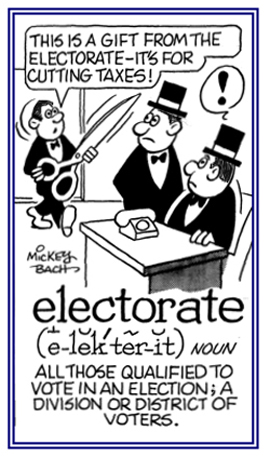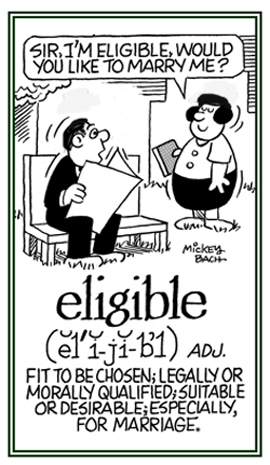legi-, -leg-, -ligi-, -lig-, -lect-, -lectic, -lection
(Latin: read, readable [to choose words; to gather, to collect; to pick out; to read, to recite])
Closely related to lexi-, -lexia, -lexic, -lexis (Greek: a word; a saying, a phrase; speaking).
electively
1. Relating to a selection by vote.
2. A reference to an elective office that is filled or obtained by election.
3. Characterized by having the power or authority to elect.
2. A reference to an elective office that is filled or obtained by election.
3. Characterized by having the power or authority to elect.
electoral
Relating to, or involving elections, electors, or voters.
electorally
1. Descriptive or, or relating to, elections; such as, they were electorally ready to vote.
2. Referring to electors or some election process.
2. Referring to electors or some election process.
All of the officially qualified voters within a given country or district for a scheduled election: Up until 1920, the women in the United States were not part of the electorate and were therefore not allowed to choose their representatives in the government.

© ALL rights are reserved.
Go to this Word A Day Revisited Index

Go to this Word A Day Revisited Index
so you can see more of Mickey Bach's cartoons.
electors
1. A college of electors.
2. People who have the right to make choices of public officers or those who have a right to vote.
2. People who have the right to make choices of public officers or those who have a right to vote.
elegance
1. A combination of graceful stylishness, distinction, and good taste in appearance, behavior, or movement.
2. A satisfying, or admirable, neatness, ingenious simplicity, or precision in something.
2. A satisfying, or admirable, neatness, ingenious simplicity, or precision in something.
elegant
1. Stylishly graceful, and showing sophistication and good taste in appearance or behavior.
2. Satisfyingly and often ingeniously neat, simple, or concise.
3. Etymology: via French élégant, from Latin elegantem, elegans, “choice”; ultimately from, eligire, “to pick out, to select with care, to choose” (a source of English "elect").
2. Satisfyingly and often ingeniously neat, simple, or concise.
3. Etymology: via French élégant, from Latin elegantem, elegans, “choice”; ultimately from, eligire, “to pick out, to select with care, to choose” (a source of English "elect").
elegantly
Descriptive of something which has been done with elegance, or in a tastefully elegant manner.
1. Meeting the necessary qualifications for being chosen or allowed to take part in doing something: Having a valid driver's license means that a person has an eligibility to drive a car.
A person might have the eligibility to take an upper level computer class, but that doesn't mean that he or she has the eligibility to teach a course in computer programming. 2. Etymology: from Latin eligere, "to choose".
eligible (adjective), more eligible, most eligible
1. A reference to those who are entitled or qualified to do, to be, or to get something: Jack and Jill were an eligible couple for marriage even though they were teenagers.
2. Pertaining to someone who, or something that, meets a set of requirements: Because Jackie has turned 18 this year, she is now eligible to vote in the upcoming election.

© ALL rights are reserved.
Go to this Word A Day Revisited Index
2. Pertaining to someone who, or something that, meets a set of requirements: Because Jackie has turned 18 this year, she is now eligible to vote in the upcoming election.

Go to this Word A Day Revisited Index
so you can see more of Mickey Bach's cartoons.
eligibleness
1. Capable of being chosen or elected.
2. Anyone who, or that which, satisfies appropriate conditions for some activity or situation.
2. Anyone who, or that which, satisfies appropriate conditions for some activity or situation.
elite
1. Belonging to an elite, especially in being more talented, privileged, or highly trained that the rest.
2. A group or class of people enjoying superior intellectual, social, or economic status.
3. A small group of people within a larger group who have more power, social standing, wealth, or talent than the rest of the group.
4. Etymology: from French élite, "selection, choice"; from Old French elire, elisre, "to pick out, to choose", from Latin eligere, "to choose".
2. A group or class of people enjoying superior intellectual, social, or economic status.
3. A small group of people within a larger group who have more power, social standing, wealth, or talent than the rest of the group.
4. Etymology: from French élite, "selection, choice"; from Old French elire, elisre, "to pick out, to choose", from Latin eligere, "to choose".
Honestas et diligentia.
Honesty and diligence.
Motto of Suffolk University Law School, Boston, Massachusetts, USA.
idiolect
1. An individual person’s vocabulary and particular and unique way of using language.
2. The speech of an individual, considered as a linguistic pattern unique among speakers of his or her language or dialect.
2. The speech of an individual, considered as a linguistic pattern unique among speakers of his or her language or dialect.
illegible
Impossible or very difficult to read.


